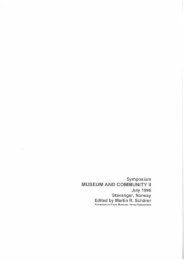Key Concepts of Museology - ICOM
Key Concepts of Museology - ICOM
Key Concepts of Museology - ICOM
You also want an ePaper? Increase the reach of your titles
YUMPU automatically turns print PDFs into web optimized ePapers that Google loves.
44<br />
objects. The museum institution,<br />
created and maintained by society,<br />
rests on a collection <strong>of</strong> standards<br />
and rules (preventive conservation,<br />
forbidden to touch objects or display<br />
substitutes while presenting them<br />
as originals) which are founded on<br />
a value system: preservation <strong>of</strong> heritage,<br />
presentation <strong>of</strong> works <strong>of</strong> art<br />
and unique pieces, the dissemination<br />
<strong>of</strong> current scientifi c knowledge, etc.<br />
Emphasising the institutional nature<br />
<strong>of</strong> museum thus means strengthening<br />
its normative role and the authority it<br />
has in science and the fi ne arts, for<br />
example, or the idea that museums<br />
remain “in the service <strong>of</strong> society and<br />
its development.”<br />
3. In contrast to the English, which<br />
does not precisely differentiate<br />
between them (and in general to the<br />
way they are used in Belgium and in<br />
Canada too), the terms institution and<br />
establishment are not synonymous.<br />
Museum, as an institution, is different<br />
from museum as an establishment,<br />
a specifi c concrete place: “The<br />
museal establishment is a concrete<br />
form <strong>of</strong> the museal institution”<br />
(Maroević, 2007). One should note<br />
that questioning <strong>of</strong> the institution,<br />
even purely and simply denying it (as<br />
in the case <strong>of</strong> Malraux’s imaginary<br />
museum or the fi ctitious museum <strong>of</strong><br />
the artist Marcel Broodthaers) does<br />
not mean that it has left the museal<br />
fi eld, in so far as the museal fi eld can<br />
extend beyond the institutional framework.<br />
In its strict sense, the term<br />
virtual museum (existing in essence<br />
but not in fact) takes account <strong>of</strong> these<br />
museal experiences on the margin <strong>of</strong><br />
institutional reality.<br />
This is why in many countries, in<br />
particular in Canada and Belgium,<br />
people use the expression ‘museal<br />
institution’ (institution muséale) to<br />
identify an establishment which<br />
does not have all the characteristics<br />
<strong>of</strong> a traditional museum. “By museal<br />
institutions, we mean non-pr<strong>of</strong>i t establishments,<br />
museums, exhibition and<br />
interpretation centres which, besides<br />
the functions <strong>of</strong> acquisition, conservation,<br />
research and management <strong>of</strong><br />
collections that some may carry out,<br />
have in common that they are places<br />
<strong>of</strong> education and dissemination<br />
dedicated to the arts, history and the<br />
sciences.” (Société des musées québécois,<br />
Observatoire de la culture et des<br />
communautés du Québec, 2004).<br />
4. Finally, the term ‘museal institution’<br />
can be defi ned, like ‘fi nancial<br />
institution’ (the IMF or the<br />
World Bank) as all the national or<br />
international bodies which govern<br />
museum operations, such as <strong>ICOM</strong><br />
or the former Direction des musées<br />
de France.<br />
DERIVATIVES: INSTITUTIONAL, MUSEAL INSTITUTION.<br />
CORRELATED: ESTABLISHMENT, PUBLIC DOMAIN,<br />
PUBLIC OWNERSHIP, PUBLIC TRUST, VIRTUAL MUSEUM.
















